The Lost and the Damned Read online
Page 2
‘We will not fall,’ he said with utmost certainty. ‘We will stand.’
Altai Wastes, 13th of Secundus
Thousands of kilometres away, in a land where cold wind cut over bare peaks, other eyes watched the skies. From Altai, the Palace was a glow reflected from the heavens. The curve of Terra hid the Palace and the mountains it usurped, but the Emperor’s home dominated the globe. One was always certain where it was, no matter how far distant, for in an empire of a million systems, Terra was but a small place.
Horus’ fleet swam above the city shine, like sparks over distant forest fires. To the watchers on the mountainside the first shell fell obviously down the sky in a bright tear-track streak. In the long slit lens of high-powered magnoculars, it shone even brighter.
Myzmadra lowered the magnoculars from her mask lenses. The lenses and magnoculars worked together to snatch at the light and drag the image so close to her that she felt she could feel the shell’s re-entry heat. Bringing the magnoculars down ended the illusion, and she shivered with the cold, though she wore a voluminous cloak over her body glove. Puffs of air exhausted of oxygen blew away from her breathing ports in misty curls.
‘Is that the signal?’ Ashul didn’t feel the cold like her. He tolerated the high altitude better too and so wore no mask. His left eye was shut gently, the other pressed to the scope of his sniper-las, watching the shell as it came apart under the anti-munitions beams.
‘It is as good as any,’ she said. ‘We have to be quick. Altai is a long way from Southern Himalazia.’
The mountain over the valley had a perfectly squared chunk removed from it. At the bottom of this square the sun could never touch was a mining town built around a monorail halt, currently crammed to capacity with people rounded up for the final conscription.
‘There will be no more trains after this,’ said Ashul.
The glaring light cast by the town’s tall lumen pylons picked out every individual in the crowd as clearly as rocks in the desert under noonday sun. He swept his sight over them, idly calculating beam diffraction and the difficulties of distance kills.
‘You can get us in there?’ he asked.
‘Do you think I can’t?’ said Myzmadra.
Over the Palace, the bombardment began in earnest. The sky flashed, and the earth shook.
Ashul shrugged. ‘Our luck has to run out sooner or later.’ Privately, he felt their luck was exhausted when they’d been sent back to Terra. Not so long ago he made the mistake of telling Myzmadra this. ‘Our orders keep coming, but the assets dwindle. Now the end.’ He waved to the rising false dawn of the bombardment. ‘This is the last run for us. We’ll get caught, or we’ll die in the crossfire.’
‘Do you care?’ Myzmadra said.
Another cynical shrug. ‘I still believe in the Legion, if that’s what you’re asking.’
‘It wasn’t.’ Myzmadra divested herself of her kit, all of it – cloak, pouches, weapons, everything she carried. She did so methodically. Only when she stripped off her body glove did she begin to hurry. In the glare leaking from the town her naked body was cast into a relief as pronounced as the Altai Mountains: peaks of muscle, deep valleys between. Goosebumps formed all over her. Everyone has weaknesses, thought Ashul, being cold was one of hers. She was his.
‘Do you care about dying?’ she said.
He wished she hadn’t put it so baldly.
‘I do care. I thought I wouldn’t,’ admitted Ashul. ‘Death in the abstract is a friendlier fellow than death in the flesh, and he’s breathing down my neck right now.’
She kept her mask on, because anyone who could get a mask like that in the Altai wore one. They were relatively common despite their expense. From a backpack, she pulled out padded utility clothes worn by the workers, and a heavy, waist-length jacket. She shuddered noticeably as she clothed herself again. The body glove was a far more efficient form of insulation than the worker’s uniform.
‘You’ve become afraid,’ she said.
‘I’m no coward,’ said Ashul. ‘We’re all going to die, one way or another. I’m still with you. You asked, I said. I don’t want to die, but I will if I have to. I’d prefer it if it made a difference.’
‘We’ll make a difference.’
‘What are our orders, even?’
‘Free rein,’ she said. ‘Havoc. We’ll find something.’
‘Will we?’ he asked flatly.
Myzmadra gave him a look he had come to know only too well. Her face was invisible under the mask, of course, but the look was there, on her face, right now. He could tell from the tilt of her head. He could tell from the tone of her voice.
‘You do your job, Ashul.’
He got up and dusted his knees off. His rad counter gave out five slow clicks; the mountains were rife with residual radiation from one of Terra’s forgotten wars. He’d read somewhere that the region used to be quite beautiful, a land of rivers, forests and steppes. He couldn’t believe this freezing desert could be any other way than what it was today. He couldn’t even imagine it. That was always his problem, he thought, no imagination. That was why he never believed the Emperor.
‘I will,’ he said. He dumped his rifle with some regret. It was a good gun.
His other possessions – stub pistol, knife, rations and such – were common enough to pass as the authentic kit of a dirt miner.
They wrapped their belongings in plastek before placing them in a cleft in the stone and heaping rocks on top of them. They would not be coming back, and nobody would find the cache, but old habits died hard.
‘Alpha to Omega,’ he said.
‘Alpha to Omega,’ she responded.
They snuck down the mountain. The muster point was simmering with tension. The few officials present struggled to keep order. Everyone was scared. Nobody on Terra had slept well for months; hellish nightmares tormented all the world.
The crowd, heaving with irritation and fear, absorbed Ashul and Myzmadra without ever noticing they were there.
End of the line
Eternity Terminus
Through the Palace
Eternity Terminus, 13th of Secundus
Bolts rattled in the pitch-dark, startling Katsuhiro from the numb, aimless terror that had replaced sleep. The door to the cargo container swung down and out on creaking hinges, slamming hard onto rockcrete. Light that wasn’t so very bright but seemed as glaring as a plasma flash flooded the compartment. When his eyes adjusted, lumens grouped in berry bunches on iron vines were the first thing Katsuhiro saw of the Imperial Palace. Beyond the lights was a ceiling of coloured glassaic, softly backlit. Everything else was obscured by the throng crammed into the freight container. Since the very beginning of the sixteen-hour trip, there had been standing room only. His legs shook with the effort of remaining still so long. If it weren’t for the bodies rammed in beside him, Katsuhiro would have fallen.
Trying to crane his neck to see better invited a sharp spasm of cramp. His kitbag pulled at him, sending spiders of pain over his scalp and making his shoulder ache. The bag had been plucked from a pile of identical bags and slung around his neck when he boarded. There had been insufficient room for him to adjust it. He blinked and cracked his stiff spine. As if summoned by the pop of his bones, the noise outside started abruptly, and overwhelmingly.
Whistles blew. Voices bellowed.
‘Move, move, move, move, move, move!’
The passengers were slow to obey. The groans and mutters of men and women long confined turned to shouts as burly men reached into the containers and hauled individuals out at random. After hours and hours of the rattling, stifling quiet of the train, the noise was terrifying. Despite the demands of the marshals outside, the conscripts shuffled forwards in the dazed way common to large crowds. They were hemmed in by the people around them. Progress was tortuous. The light outside remained unreachable. Biting gusts
of thin air blasted into the container, churning up the damp, sweaty fug. There had been nowhere to relieve themselves. Urine stink stung Katsuhiro’s eyes.
The threat of a shock maul’s buzz motivated the first row onto the platform, and the occupants of the container surged. They toppled out, some falling, trampled by those behind. With no more agency than a molecule of water, Katsuhiro drained towards the open ramp. The lights and the beautiful ceiling drew nearer and nearer, then the man in front of Katsuhiro was yanked forwards hard by the bag around his neck, and Katsuhiro went after him, falling into the Imperial Palace and the open gullet of war.
Thousands upon thousands of people were spilling from containers clamped to flatbed trucks into a monorail terminus. Katsuhiro could not see far, but the pressure of many people pushed at him from all directions. Voices shouted, wailed, screamed and begged in cacophonous profusion.
A marshal half caught Katsuhiro, and a flash of a face behind an armoured visor joined all the other fragments of sensory information that fought their way into his mind. Badges of the Adeptus Arbites surmounted with unfamiliar heraldry flashed past and Katsuhiro was shoved into the reeking flow of humanity pouring towards destruction. Bells and sirens sang from every quarter, and from far away there came a steady thudding, as insistent and dull as a thousand hearts. He was turned around in the crowd, sucked into eddies in the human river before being shoved back out into swift currents. Men and women of all kinds jostled him: scribes, old warriors, algae farmers, technicians, rich, poor, young, old. Every hue of skin and eye and hair present upon Terra was there. Every uniform and badge of occupation Katsuhiro had ever seen, and thousands more besides. His head spun with the overload. More details stabbed into his awareness, painful as darts. Decorations on the walls, a noble face captured in a marble relief. A sign proclaiming his location to be Eternity Terminus, Sub-Platform 99-8-Epsilon. The expressions of his fellows, two in particular – one blue-eyed and leering, the other brimful of fear – struck him. Hands grabbed at him. He was funnelled between a stack of boxes and a gun slapped into his hands. The crush increased as the crowd slowed unbearably. Elbows played his ribs as if they were bars on a semandron. The smell was dreadful. The noise was worse. Then he was out the other side, pushed along with gathering speed. All the people on the platform had only two things in common: the mass-produced lasguns clasped in their uncertain hands, and the kitbags slung around each of their necks, dragging them into hunches. Some struggled, now they were moving, to switch the straps to their shoulders, but there was as little space on the platform as there had been on the trains. Katsuhiro saw a man drop his gun. When the man bent to pick it up, the weight of the crowd pushed him down. Katsuhiro did not see him rise.
Katsuhiro blundered into a pillar, raising more bruises to add to those he already had. His feet snagged on something soft. He glanced down to see a dead man, blood running from his nose and ears, crushed by the herd. He recoiled, rebounded off a giant stacked with vat-grown muscle, bald, squinting and full of violence.
‘Watch it,’ the giant growled. Katsuhiro backed away apologetically, and the crowd caught him again, whirling him away, while from above the rapid, hurried heartbeats boomed on and on.
The platforms opened out and the ceiling sprang away from them, lofted upwards on giant piers of stone and plasteel, the crowd spreading across the vast concourse sheltered beneath. The panes of coloured glass lost their individual form, merging into a display that stopped the breath in Katsuhiro’s lungs. Captured in glassaic, men and women stood victorious upon a field of battle. Supplicants bowed, defeated, holding out their hands in fealty towards the figure dominating the centre of the piece.
‘The Emperor!’ Katsuhiro gasped. So lifelike was the display, so radiant the figure, that for a second the addled Katsuhiro thought the Master of Mankind was standing above them in judgement. A triple thump of the ceaseless hearts broke the spell, stuttering the lumens behind the image and cracking certain panes to shards. Colourful, razored rain fell that brought blood and screams from the crowd.
The conscripts slowed again, spread out and dawdled, as a swift river is arrested by a lake. Katsuhiro had a moment to catch his breath. The sheer size of the muster was sinking in, and it terrified him. Empty trains were pulling out, fresh ones rolling in. Hot engines and overtaxed rail levitators baked the scent of metal into his nostrils.
Grille-gates rattled somewhere off to the right. Whistles blew again. A line of marshals, or arbitrators, or whoever they were, formed across one side of the plaza. More gently this time, the crowds were directed towards a row of arches and through the opened gates. Katsuhiro passed through into the terminus’ hidden spaces, utilitarian cargo halls of new rockcrete where cranes and conveyor belts sat idle. All were bereft of the usual goods, and full instead with the chiefest currency of war, that of human bodies. Armies and armies of people shuffled within.
Issuing from a line of officers at the far side, men pushed their way deep into the crowds, grabbing people and directing them to groups that grew swiftly.
‘You, you, you, you.’ There were no pauses between their words. Gloved hands grabbed shoulders, hung coloured chits around necks and impelled the dazed populace of Terra towards the officers behind them. ‘You, you, you,’ they barked from helm speakers and external voxmitters, the voices roughed to inhumanity as they rounded up the nations of the world, broke them apart and pressed them towards their deaths. People cried as friends, lovers and families were separated. The officials did not notice nor did they care. ‘You, you, you.’
Katsuhiro’s time came soon enough. A leather gauntlet grabbed him, a second dragged a green plastek chit on a chain over his head, catching his ear painfully in the process, and shoved him on his way. A small desk greeted him. Numbly, he presented his token to the army officer behind, which earned him another shove, and so, as aimless as driftwood, Katsuhiro came to a slow, grounded stop with a hundred others all clutching green plastek and blinking fearfully.
‘What do we do?’ said a lean woman, wasted by years of short rations. Thinness was a look common to them all.
‘You be quiet,’ shouted a uniformed man with a harried face. ‘And you wait.’
The man moved on without paying them any more attention, pushing himself sideways like a blade through the recruits.
‘You there!’ he shouted. ‘You there! Stop–’ and he was gone, his commands vanishing into the chorus of voices echoing in the cargo hall.
Katsuhiro shook. Shock, lack of food, cold and the effort of standing upright for so many hours were each enough alone to upset his humours. Together, they brought him close to collapse.
A warm hand slipped around his side and pulled him close. Ordinarily Katsuhiro would have recoiled from such unexpected intimacy, but now he welcomed it.
A small, powerfully built man had him. Shorter by a few centimetres than Katsuhiro, he had to look up to address him. He was filthy, and stank of oil and stale clothes, but his smile was genuine.
‘It is cold, isn’t it?’ he said. ‘Enough to knock you down if you aren’t used to it. Winter at the top of the world!’
Katsuhiro frowned at him, growing embarrassed by the embrace. Being so close to someone else bothered him. It was not the done thing in his subculture. Needing the support shamed him more.
‘Yes,’ he managed. ‘Thank you. Please, let me go. I am fine now.’
‘You sure?’ The man released him anyway. The man’s left hand grasped the straps of his kitbag and rifle, both slung neatly over his right shoulder. He held out his dirty right hand. ‘The name’s Doromek. From Baltica.’
Katsuhiro swallowed his distaste and limply shook Doromek’s hand.
‘Katsuhiro,’ he said.
‘Dragon nations, eh?’ said Doromek. ‘We’ve got a fine mix here and no mistake. Tell you what, let’s get you sorted out. You want to get that bag strap off your neck.’
A
s Katsuhiro struggled the bag over his head – it had somehow gained weight since it had been hung there – the man continued talking.
‘You’ll find some tablets in there. Recaff tabs, salt and glucosium energy blends. Take one of each. Chew them up, don’t just swallow them – it’ll get the spit flowing in your mouth and make it easier for your body to process them. You hear me?’
‘Is there water?’
‘Not yet,’ said the dirty little man. He looked behind him. Flustered officers were arguing with a man in the robes of an adepta alien to Katsuhiro. ‘They’re not coping very well,’ said Doromek. ‘Hurry up though, we’ll be moving out soon.’
‘Where to?’ he said.
The man snorted. ‘Where do you think? The fighting. You hear that noise?’ He pointed upwards. ‘The bombardment has begun. The traitors are here. This is the big…’ He frowned at Katsuhiro’s fumbling. ‘What are you doing to your kit? Give me that.’
Doromek grabbed his bag. Katsuhiro surrendered it. Doromek set it on the ground. Once he had the drawstring open Katsuhiro saw the contents neatly arrayed, all sealed in plastek packets. Doromek moved aside.
‘You need to learn your way around this. This one, this one and this one.’ He pointed with a strong, broad finger.
Katsuhiro ripped open the packets his new companion indicated and placed the pills in his mouth. ‘Thank you. I have no idea what–’
A hard-faced woman barged her way into their conversation.
‘You two. Shut up,’ said the woman. ‘They don’t like it if you talk. I don’t want the attention.’
‘But someone’s got to tell us what’s going on!’ Katsuhiro protested.
Another responded to this, a man even thinner than everyone else, who was cleaning his nails with a worn knife. ‘They don’t have to tell you anything, my friend. Nobody does.’

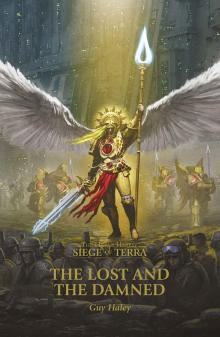 The Lost and the Damned (The Horus Heresy Siege of Terra Book 2)
The Lost and the Damned (The Horus Heresy Siege of Terra Book 2)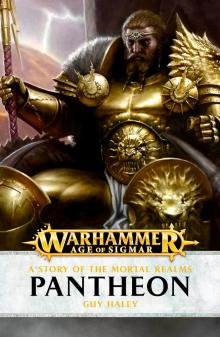 Pantheon
Pantheon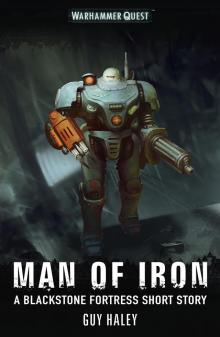 Man of Iron
Man of Iron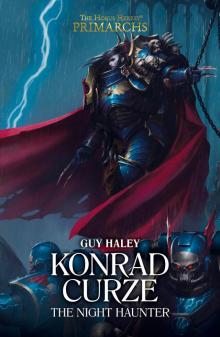 Konrad Curze the Night Haunter
Konrad Curze the Night Haunter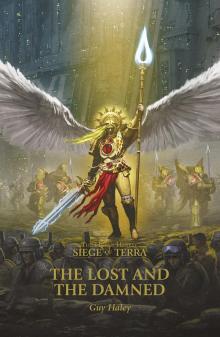 The Lost and the Damned
The Lost and the Damned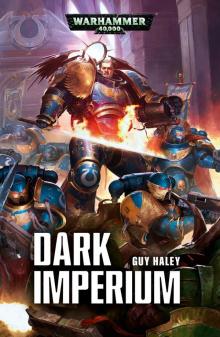 Dark Imperium
Dark Imperium Hoppo's Pies
Hoppo's Pies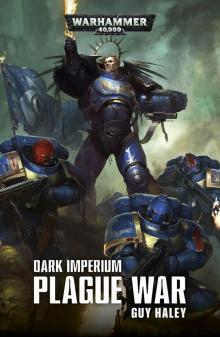 Dark Imperium: Plague War
Dark Imperium: Plague War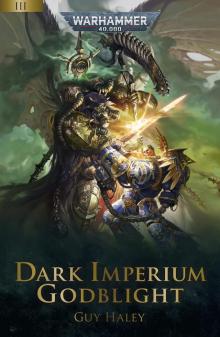 Dark Imperium: Godblight
Dark Imperium: Godblight Crash
Crash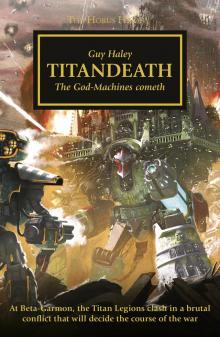 Titandeath
Titandeath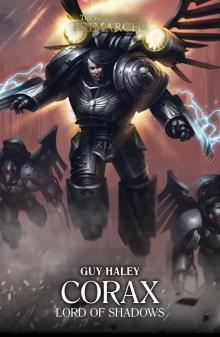 Corax- Lord of Shadows
Corax- Lord of Shadows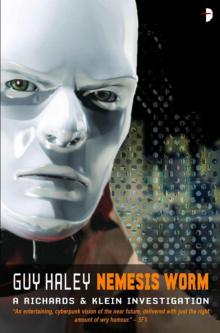 The Nemesis Worm
The Nemesis Worm Wolfsbane
Wolfsbane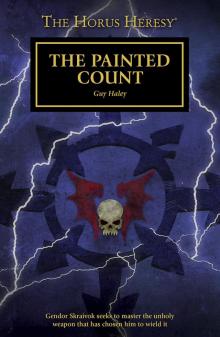 The Painted Count
The Painted Count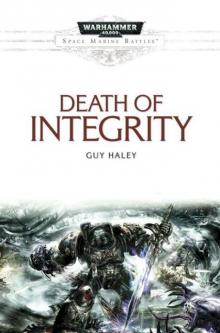 The Death of Integrity
The Death of Integrity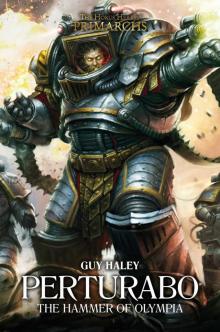 Perturabo: Hammer of Olympia
Perturabo: Hammer of Olympia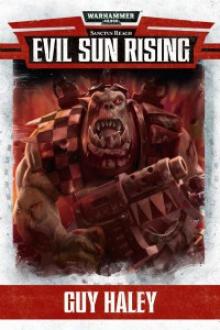 Evil Sun Rising
Evil Sun Rising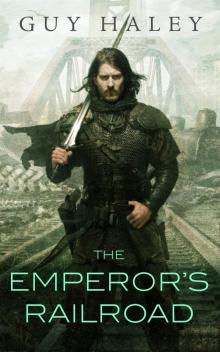 The Emperor's Railroad
The Emperor's Railroad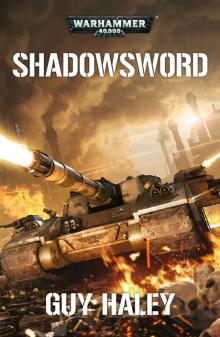 Shadowsword
Shadowsword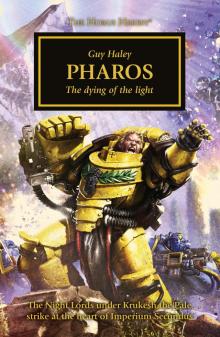 Pharos
Pharos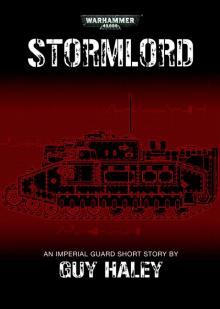 Stormlord
Stormlord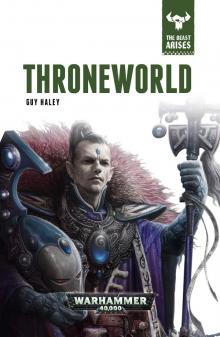 Throneworld
Throneworld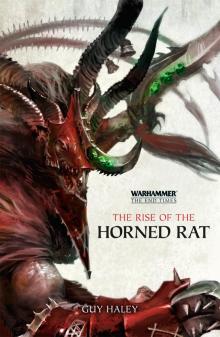 The End Times | The Rise of the Horned Rat
The End Times | The Rise of the Horned Rat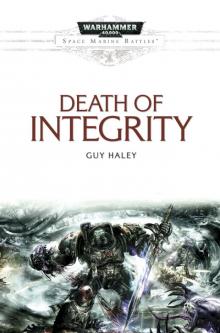 Death of Integrity
Death of Integrity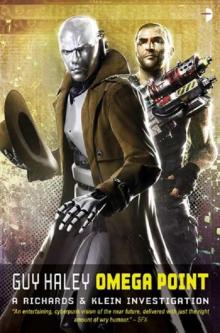 Omega Point
Omega Point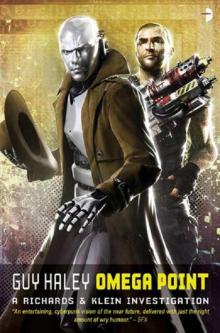 Omega point rak-2
Omega point rak-2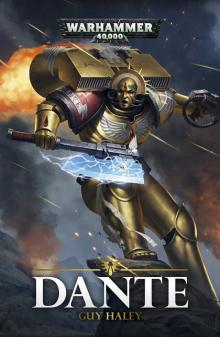 Dante
Dante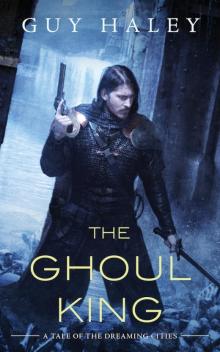 The Ghoul King
The Ghoul King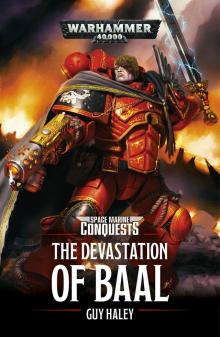 The Devastation of Baal
The Devastation of Baal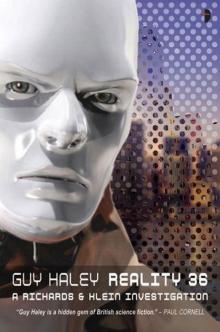 Reality 36: A Richards & Klein Novel
Reality 36: A Richards & Klein Novel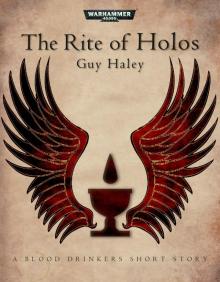 The Rite of Holos
The Rite of Holos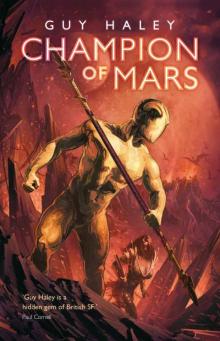 Champion of Mars
Champion of Mars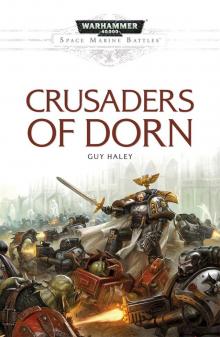 Crusaders of Dorn
Crusaders of Dorn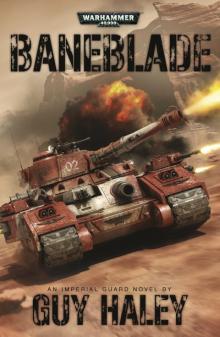 Baneblade
Baneblade